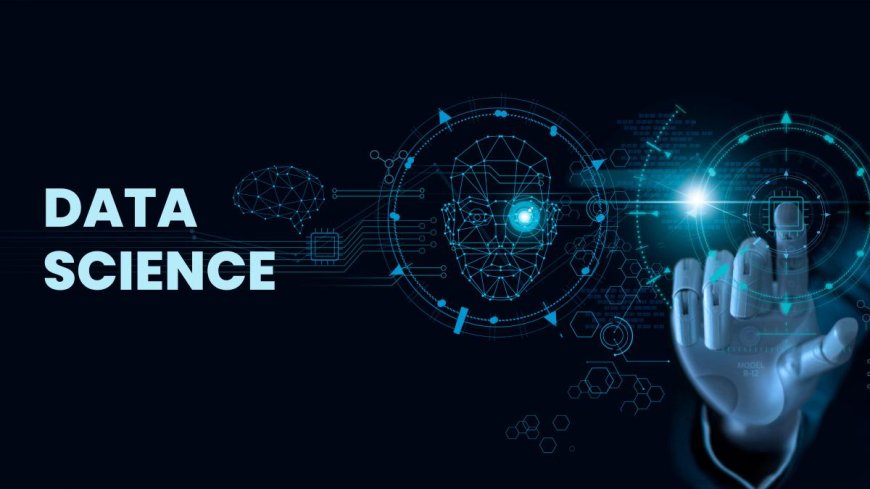Is Data Science a Good Career?
Explore the viability of a career in data science. Uncover the skills needed, preferred educational backgrounds, and the role of coding proficiency. Gain insights into the challenges and opportunities in this dynamic field.

One area that has attracted a lot of interest in the quickly changing job market is data science. The need for experts who can interpret enormous volumes of data is growing as the digital age progresses.
The Rise of Data Science in the Digital Age
Data science has become integral to diverse industries. The growing digitization of processes and the rise of big data have flooded organizations with vast amounts of information. This data influx underscores the demand for proficient individuals capable of extracting valuable insights. The essence lies in the ability to translate raw data into actionable intelligence, steering organizations toward well-informed decision-making.
As businesses strive to harness the power of information, the role of data scientists has evolved into a crucial component of strategic planning and problem-solving. This paradigm shift reflects the significance of data science in addressing the challenges posed by the data-rich environment, emphasizing the practical application of skills to extract meaningful value from the wealth of available information.
What is data science?
Data science is a multidisciplinary field that involves the extraction of insights and knowledge from structured and unstructured data. It encompasses a range of techniques, processes, and systems to analyze and interpret complex data sets. The primary goal of data science is to uncover hidden patterns, trends, and correlations within the data, providing valuable information for informed decision-making.
Why choose data science?
High Demand: The demand for data scientists is consistently high across various industries. Organizations are increasingly relying on data to make informed decisions, creating a sustained need for professionals skilled in data analysis.
Versatility: Data science is a versatile field with applications in diverse sectors such as finance, healthcare, marketing, and technology. This versatility allows individuals to explore different industries and find roles that align with their interests.
Innovation Opportunities: Data science is at the forefront of technological innovation, especially with advancements in machine learning and artificial intelligence. Choosing data science opens doors to working on cutting-edge projects and contributing to groundbreaking developments.
Problem-Solving Impact: Data scientists play a crucial role in solving complex problems. By extracting meaningful insights from data, they contribute directly to improving business strategies, enhancing efficiency, and addressing challenges faced by organizations.
Continuous Learning: The field of data science is dynamic, requiring continuous learning and adaptation to stay relevant. For those who enjoy staying intellectually engaged and embracing new challenges, data science provides an ever-evolving scene for growth.
Global Relevance: The skills acquired in data science are in demand globally. This makes it a career path with international opportunities, allowing professionals to work on a global scale and collaborate with diverse teams.
Competitive Salaries: Data science roles often come with competitive salaries, reflecting the high value organizations place on the skills and insights that data scientists bring to the table.
Job Security: As long as organizations rely on data for decision-making, the need for skilled data scientists is likely to remain robust, providing a sense of job security in the ever-changing job market.
What skills, education, and coding proficiency are crucial for aspiring data scientists?
Aspiring data scientists often ponder the prerequisites for their career path. Essential skills encompass a mix of technical prowess, including proficiency in programming languages like Python or R, a solid foundation in statistics, and effective data visualization abilities.
While various educational backgrounds are welcomed, a preference is typically given to quantitative fields like computer science or engineering. Coding proficiency is indeed a prerequisite, with languages such as Python playing a vital role. Addressing these queries provides crucial insights for individuals contemplating a rewarding journey into the field of data science.
Let’s take a look at each type in a little more depth.
Skills Required
Data science is a multidisciplinary field that requires a combination of technical and analytical skills. Proficiency in programming languages such as Python or R is often considered essential. A solid understanding of statistics and mathematics is crucial for interpreting data accurately. Additionally, data visualization skills and the ability to communicate findings effectively are highly valued in the industry.
Educational Background
While there is no one-size-fits-all educational path for a career in data science, a background in quantitative fields such as computer science, statistics, or engineering is commonly preferred. Many data scientists hold advanced degrees, such as master's or Ph.D. However, practical experience and a strong portfolio of projects can often outweigh formal education in this field.
Coding Proficiency
Coding is an integral part of data science, and proficiency in languages like Python, R, or SQL is typically expected. However, the level of coding expertise required may vary depending on the specific role and industry. Continuous learning and adaptation to new tools and languages are essential as the field evolves.
Opportunities
Data science offers a myriad of opportunities for career growth and development. The versatility of the skills acquired in this field allows professionals to transition across industries. Whether it's healthcare, finance, marketing, or technology, the application of data science is ubiquitous. The demand for data scientists is not limited to a specific sector, providing a wide array of options for individuals pursuing this career.
Advancements in technology, such as machine learning and artificial intelligence, further expand the horizons for data science professionals. The ability to work on cutting-edge projects and contribute to groundbreaking innovations adds to the allure of a career in data science.
Sustainability
One aspect often overlooked in career considerations is the sustainability of a profession. Data science, being at the intersection of technology and business, exhibits a robust sustainability factor. As long as businesses rely on data for decision-making, the need for skilled data scientists will persist. This sustainability ensures that a career in data science is less susceptible to economic downturns compared to some other professions.
Work-Life Balance
Maintaining a healthy work-life balance is a concern for many professionals. The dynamic nature of data science projects may sometimes lead to tight deadlines and intense work periods. However, the flexibility of working remotely and the option to choose projects that align with personal preferences can contribute to a more balanced work-life dynamic.
Data Science Salaries
Data science salaries vary based on factors such as experience, location, education, and the specific industry.
-
Entry-Level Positions (0-2 years of experience): Entry-level data scientists can expect salaries ranging from $60,000 to $90,000 annually. This may vary based on factors like the company's size and location.
-
Mid-Level Positions (2-5 years of experience): Mid-level data scientists with a few years of experience typically earn between $80,000 and $120,000 per year.
-
Senior-Level Positions (5+ years of experience): Senior data scientists or those with significant experience can command salaries well over $120,000, with some earning $150,000 or more.
-
Location Impact: Salaries can significantly differ based on the region. For instance, data scientists in tech hubs like Silicon Valley or cities with a high cost of living generally receive higher compensation compared to other areas.
-
Education Impact: Individuals with advanced degrees, such as a master's or Ph.D., may secure higher salaries. However, practical experience and a strong portfolio can also play a crucial role.
-
Industry Differences: Data scientists working in industries like finance or healthcare, where the application of data science is critical, may receive higher salaries compared to other sectors.
It's important to note that these figures are general estimates, and the data science job market is dynamic, with salaries subject to change based on market trends and demand. Prospective data scientists should also consider additional benefits, such as bonuses, stock options, and other perks when evaluating job offers. For the most up-to-date and specific information, it's advisable to research current salary trends in the desired location and industry.
Challenges and consideration
Data science, while promising, confronts several challenges and considerations. The perpetual evolution of technology demands continuous learning for professionals to stay relevant. The sheer volume of data generated presents challenges in terms of processing, storage, and analysis. Ethical concerns, including data privacy and bias, necessitate meticulous consideration in every stage of the data science process. Additionally, the interdisciplinary nature of data science requires effective communication between data scientists and domain experts.
Balancing the need for accuracy and interpretability in complex models poses yet another challenge. Amidst these hurdles, data scientists need to embrace a holistic approach, integrating technical expertise with ethical considerations and effective communication.
Data science has become a very attractive career option because of its crucial function in the digital era. The field is appealing because of the rising need, relevance in the global economy, and chances for innovation. Aspiring data scientists, however, face obstacles like ongoing education, moral dilemmas, and the ever-changing nature of technology. The ability to communicate effectively, be flexible, and possess high technical expertise are all necessary for success in data science. For individuals prepared to traverse its complexity and make significant contributions to the field of information innovation, data science provides a vibrant and exciting career path with competitive compensation, sustainability, and a wide range of applications across sectors.











































